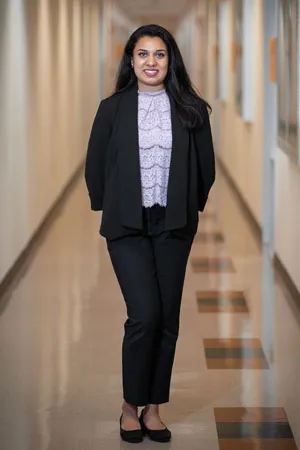UT Dallas WEHack Founder Named a Top 50 Hacker

Via Erik Jonsson School News − With minutes to go, computer science student Medha Aiyah checked her code. Though she had not accomplished a fully viable application for fashion selection within the timeframe of the HackUTD hackathon, she breathed a sigh of relief. She had tackled an intense competition while exploring an unfamiliar area of database development, which led to numerous new opportunities.
Aiyah landed several internships and became an event organizer for HackUTD, the largest hackathon in North Texas. Ultimately, she inspired other women and nonbinary people by organizing WEHack 2020.
Aiyah landed several internships and became an event organizer for HackUTD, the largest hackathon in North Texas. Ultimately, she inspired other women and nonbinary people by organizing WEHack 2020.
For her efforts, Aiyah was recently recognized as a Top 50 Hacker by Major League Hacking, an organization that includes thousands of participants in North America and Europe.
“I like how UT Dallas empowers students to make a difference,” said Aiyah, a senior computer science major in the Erik Jonsson School of Engineering and Computer Science.
Entering the Arena
Aiyah already had a leadership record before she entered The University of Texas at Dallas. As a Girl Scout Gold Award recipient, she introduced girls to STEM concepts through a hackathon hosted in her hometown of El Dorado Hills, California. Her father, who holds a PhD in electrical engineering, encouraged her to visit Intel Corp. and consider attending a university with a strong STEM program.
After visiting the campus, Aiyah knew UT Dallas was the right place for her. However, she said she also realized she would need a broad support system in order to lead in a male-dominated field.
“Someone came to our class to tell us about HackUTD, and I gave it a shot,” Aiyah said. “And yes, I immediately noticed a gender imbalance. I wanted a more inclusive event, so I became a logistics organizer for one year at HackUTD.”
Even with women on the planning committee, Aiyah was not convinced that the venue would best support first-time women and nonbinary hackers. She connected with outside hacking organizations where she was inspired to plan the University’s first hackathon dedicated for women and nonbinary participants.
“I attended HackCon in Pennsylvania, and I met with other organizers,” Aiyah said. “I learned about hackathons for women and nonbinary students. In November 2019, I shared the idea with the Society of Women Engineers (SWE) president, and we decided to go for it.’”
Reworking WEHack
Aiyah worked on the technical and financial logistics of hosting a large, in-person event dubbed WEHack. She faced added pressure to secure first-time sponsors, so she worked with development leaders in the Jonsson School. She also received support from University leaders including Dr. Stephanie G. Adams, dean of the Jonsson School.
“Medha Aiyah is an outstanding leader who effectively transfers her experiences into actionable opportunities for others,” said Adams, also holder of the Lars Magnus Ericsson Chair and professor of systems engineering. “Medha used her leadership with the largest hackathon in North Texas, comprised mostly of male participants, to create a first-of-its-kind hackathon for women and non-binary people — traditionally marginalized groups in tech. Initiatives such as these help increase inclusivity in the tech pipeline. Her efforts let women and nonbinary people know that they too belong in engineering and computer science programs at UT Dallas and can compete in tech and computing fields.”
Just weeks before the original event was scheduled to take place in April 2020, the University entered lockdown at the start of the COVID-19 pandemic. University events were suddenly canceled, and Aiyah returned to her home state where she began remote learning.
“I returned to California, and I didn’t know what would happen,” Aiyah said. “We had to gear ourselves to a virtual environment. We essentially had to plan two hackathons in the span of a year.”
Ultimately, the work paid off. Hackers from across the globe joined WEHack in October 2020.
“We had more than 230 hackers from several countries,” Aiyah said. “We made it fun and interactive with a Discord server.”
Extending the Impact
Following WEHack, UT Dallas computer science student Caitlin Tibbetts nominated Aiyah for a Top 50 Hacker award. Aiyah was eventually named a winner out of thousands of hackers on the platform.
“I nominated Medha because she inspires me every day,” Tibbetts said. “In the fall of 2019, Medha said we needed a women-uniting hackathon at our university. I wholeheartedly agreed. Then, fast forward a year or so, I was clapping at her opening speech at WEHack! This is so indicative of who Medha is as a person. She has goals, and she runs straight toward them. I could not be prouder of her.”
Aiyah said, “I was so honored to be part of that list. I feel as though it is a collective effort, and UT Dallas has helped me grow so much.”
As Aiyah completes her senior year, WEHack 2021 will continue with new event organizers for the next group of enterprising women and nonbinary hackers. After graduation, her goal is to continue leading through a career in industry, preferably as a tech executive.
“What women and nonbinary students learn through hacking is that they are capable,” Aiyah said. “Hacking helps them learn to innovate.”
Source | Erik Jonsson School News
ABOUT THE UT DALLAS COMPUTER SCIENCE DEPARTMENT
The UT Dallas Computer Science program is one of the largest Computer Science departments in the United States with over 4,000 bachelors-degree students, more than 1,010 master’s students, 140 Ph.D. students, 52 tenure-track faculty members, and 42 full-time senior lecturers, as of Fall 2021. With the University of Texas at Dallas’ unique history of starting as a graduate institution first, the CS Department is built on a legacy of valuing innovative research and providing advanced training for software engineers and computer scientists.




